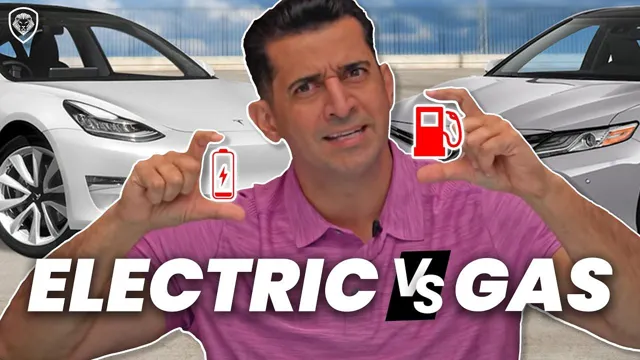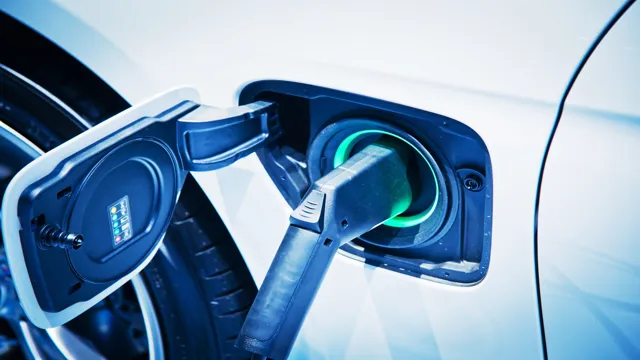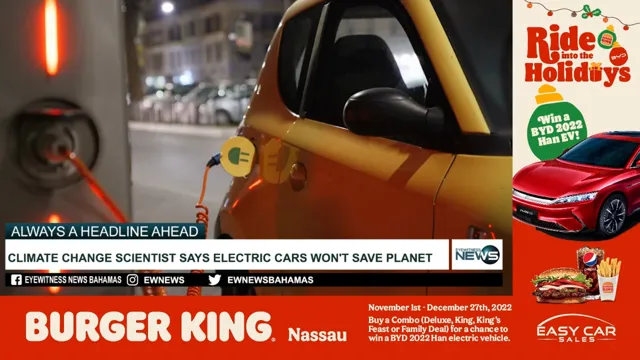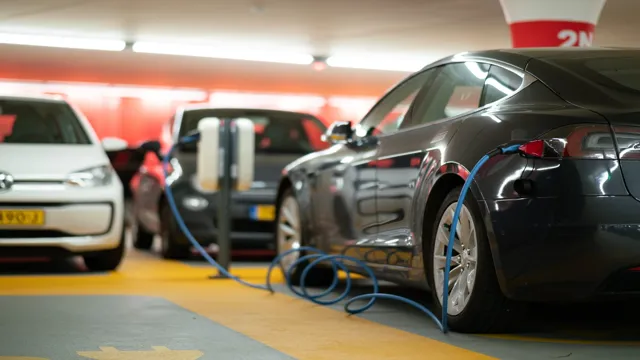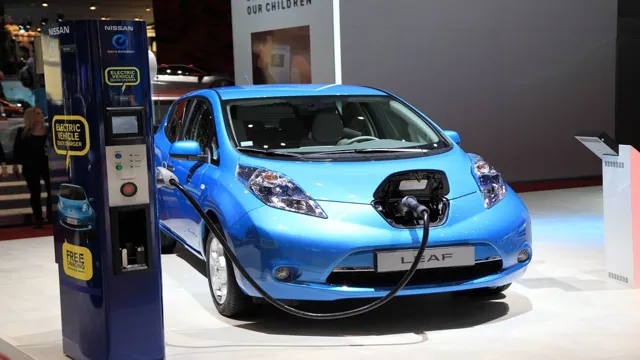Revolutionizing the Future: Can Electric Cars Be the Savior of Our Planet?
Are electric cars the answer to saving the Earth? As the world continues to grapple with the negative impacts of climate change, the search for sustainable transportation has become a top priority. Electric cars have emerged as a possible solution, promising reduced carbon emissions and a cleaner environment. But, can electric cars really save the Earth? In this blog, we’ll delve into the pros and cons of electric cars and examine their potential impact on the environment.
So if you’re curious about electric cars and their role in fighting climate change, keep reading!
Current Environmental Challenges
Electric cars have gained popularity in recent years as a more eco-friendly alternative to traditional gas-powered vehicles. And while electric cars certainly are better for the environment, the question remains: will they save the planet? As with most complex issues, the answer is not straightforward. Electric cars do emit fewer greenhouse gases than gas-powered cars, which is certainly a step in the right direction.
However, their environmental impact is not negligible. The production of electric cars requires the use of rare earth metals, which are often mined in environmentally damaging ways in countries with lax environmental regulations. Additionally, electric cars still require electricity, which may come from non-renewable sources such as coal or natural gas.
Ultimately, electric cars are not a silver bullet solution to all environmental woes, but they are a step in the right direction. It’s important to focus on reducing consumption and emissions in all areas, including transportation, manufacturing, and energy production. Only by working together can we create a more sustainable future for ourselves and future generations.
Rising CO2 emissions and its impact
The current challenge of rising CO2 emissions is having a significant impact on the environment. The increase in emissions is causing global temperatures to rise, which can lead to the melting of polar ice caps, rise in sea levels, and changes in weather patterns. The primary source of CO2 emissions is the burning of fossil fuels for energy and transportation.
The human reliance on these fuels has led to a significant increase in CO2 emissions. However, there are steps that can be taken to reduce these emissions. Switching to renewable energy sources, such as solar and wind power, can significantly reduce CO2 emissions.
Additionally, individuals can reduce their carbon footprint by using public transportation, walking, or cycling instead of driving. It’s essential to take action now to reduce CO2 emissions and create a sustainable future for ourselves and the planet.

Increasing air pollution levels
Air pollution levels have been increasing across the globe, posing a serious threat to the environment and human health. From vehicular emissions to industrial waste, there are multiple sources of air pollution, leading to a range of health problems. Studies have linked air pollution to respiratory and cardiovascular diseases, including lung cancer and asthma.
The situation is especially critical in densely populated urban areas, where people are more exposed to harmful pollutants. Governments and environmental organizations are continually addressing this issue by implementing stringent regulations to reduce pollution levels. However, it is essential to understand that everyone can play a part in reducing air pollution – from using public transport to recycling and reducing waste.
It is up to all of us to take steps towards a cleaner and healthier planet.
Electric Cars: The Solution?
The rise of electric cars has brought a lot of hope for a sustainable future. However, the question remains: will electric cars save the planet? While electric cars certainly have the potential to reduce carbon emissions and air pollution, they are not a silver bullet solution. The electricity used to power electric cars still needs to be generated, and if it comes from fossil fuel sources, then the carbon footprint is not eliminated.
Furthermore, the production of electric car batteries requires a significant amount of resources and energy, and their disposal can cause environmental damage. Nonetheless, electric cars are a step in the right direction, and with advances in renewable energy technologies, their potential benefits can be maximized. So, while electric cars alone may not save the planet, they can certainly play a crucial role in mitigating the harmful effects of climate change.
How electric cars reduce carbon footprint?
Electric cars have become the solution to reducing our carbon footprint and combating climate change. With increasing concerns about air pollution and the depletion of fossil fuels, the electric car industry has gained a lot of traction. Unlike conventional fuel-powered vehicles, electric cars run on batteries that are charged by electricity.
This means that they emit zero-emissions and have a much smaller carbon footprint compared to fossil fuel-powered vehicles. This makes electric cars eco-friendly and an attractive choice for people making the switch. Additionally, electric cars have lower maintenance costs, are quieter, and offer smoother rides.
While the initial cost of an electric car may be higher than a traditional car, overall, electric cars prove to be more cost-effective over time. With a growing emphasis on sustainability and environmental responsibility, electric cars have become a crucial solution in reducing carbon emissions and fighting climate change.
Reduction of pollution levels
Electric cars have been presented as a possible solution to the reduction of pollution levels, and with good reason. These vehicles generate no tailpipe emissions, making them an excellent choice for environmentally aware drivers. Additionally, electric cars can help reduce the amount of carbon dioxide in the atmosphere, thus helping to combat climate change.
As more and more people become aware of the impact of their driving habits on the environment, the popularity of electric cars is expected to increase. Not only do they offer a cleaner transportation solution, but they can also save drivers money in the long run. With their low maintenance needs and their use of electricity as a fuel source, electric cars are becoming a more accessible option for drivers looking to make a positive impact on the environment.
Other environmental benefits of EVs
Electric cars are often touted as a solution to the environmental problems caused by traditional gasoline vehicles. In addition to reducing emissions and improving air quality, EVs also have other environmental benefits. One of the biggest advantages is that they are much quieter than combustion engines, which can reduce noise pollution in cities and reduce stress on wildlife.
Additionally, EVs can actually help to conserve water resources, as they require less water to operate than traditional cars. This is because fossil fuel extraction and refining requires significant amounts of water, whereas EVs simply require electricity to recharge. Overall, while electric cars are not a perfect solution, they offer a promising path towards a cleaner, greener future.
Challenges Ahead
As the world shifts towards cleaner and more sustainable forms of energy, many people are turning to electric vehicles as a solution to reducing carbon emissions and saving the planet. While electric cars are certainly a step in the right direction, they are not a silver bullet solution to all the environmental challenges that we face. For one, the production of electric vehicle batteries still relies heavily on the use of fossil fuels and other non-renewable resources.
Additionally, the electricity used to charge these vehicles often comes from power plants that burn coal or other fossil fuels, further contributing to greenhouse gas emissions. While electric cars may help reduce pollution and reliance on oil, they are not a panacea for climate change. In order to truly save the planet, we must make significant changes in the way we produce and consume energy, and continue to develop and invest in cleaner, more sustainable technologies.
Cost considerations for EV adoption
EV adoption can definitely be an exciting prospect, but it’s important to keep in mind the cost considerations that may arise. For example, the initial purchase price of an electric vehicle is often higher than that of a traditional gasoline-powered car, which can be a challenge for some drivers. In addition, the cost of maintaining and repairing electric vehicles can also be higher due to the specialized technology they utilize.
However, it’s important to remember the long-term cost savings that electric vehicles can provide, such as lower fuel and maintenance costs. To help ease the burden of the upfront costs, there are often government incentives and tax credits available to those who purchase electric vehicles. It’s also important to research and compare different models to find one that fits your budget and driving needs.
With the right plan in place, the cost considerations of EV adoption can be overcome and the benefits of a more sustainable mode of transportation can be realized.
Battery Recycling and Disposal
The issue of battery recycling and disposal is becoming a pressing concern for the planet. With the popularity of gadgets and electric vehicles, the amount of spent batteries is growing at an alarming rate, and the challenge of reusing and disposing of them safely is bigger than ever. The key issue with batteries is that they contain hazardous chemicals, such as lead, cadmium, mercury, and acids, which can be detrimental to human health and the environment if not disposed of properly.
In addition, batteries have a limited lifespan and may not last as long as the actual device, leading to a higher turnover rate. As a result, industry players and government agencies need to come up with effective strategies for collecting, recycling, and disposing of batteries without affecting the environment or public health. The challenge ahead of us is to find ways to reuse old batteries or extract valuable materials from them, such as cobalt, nickel, and lithium, while minimizing the net environmental impact.
By doing so, we can reduce the waste of resources, prevent pollution, and increase sustainability.
The Verdict: Electric Cars to the rescue?
The electric car revolution has sparked a lot of optimism surrounding the future of our planet, but will these vehicles really save us from our environmental woes? The answer is not a simple yes or no. While electric cars produce zero emissions during the actual driving process, the production and disposal of batteries can have a significant environmental impact. Additionally, the electricity used to charge these cars often comes from fossil fuel-powered plants, so their true impact depends on the source of that electricity.
However, the potential for electric cars to significantly reduce emissions and pollution is undeniable. As technology improves and renewable energy becomes more accessible, electric cars can become a vital tool in our fight against climate change. It may not be the ultimate solution, but it’s undoubtedly a step in the right direction.
Conclusion
In regards to whether or not electric cars will save the planet, the answer is not a simple “yes” or “no”. While electric cars do emit less harmful pollutants than gasoline-powered cars, their production and use still have an impact on the environment. However, it is clear that the push towards electric vehicles is a step in the right direction in terms of reducing carbon emissions and addressing climate change.
At the end of the day, it is up to us as consumers and society as a whole to continue pushing for more sustainable solutions in all aspects of our lives. So, while electric cars may not save the planet on their own, they certainly have a role to play in creating a more sustainable future. As the old saying goes, every little bit helps!
FAQs
How do electric cars reduce carbon emissions?
Electric cars run on electricity, which produces fewer emissions than gasoline-powered cars. They can significantly reduce the amount of carbon dioxide and other harmful gases released into the atmosphere.
Are electric cars truly eco-friendly?
Electric cars are eco-friendly in the sense that they emit fewer greenhouse gases, but producing the batteries and electric grid infrastructure to power them does have an impact on the environment.
Do electric cars have a limited range?
Electric cars can have a limited range depending on the battery size, but with advancements in battery technology and an expanding charging infrastructure, the range of electric cars is increasing.
Are electric cars expensive to maintain?
Electric cars require less maintenance than traditional gas cars due to having fewer moving parts and not needing oil changes. However, the cost to replace the battery can be expensive.

